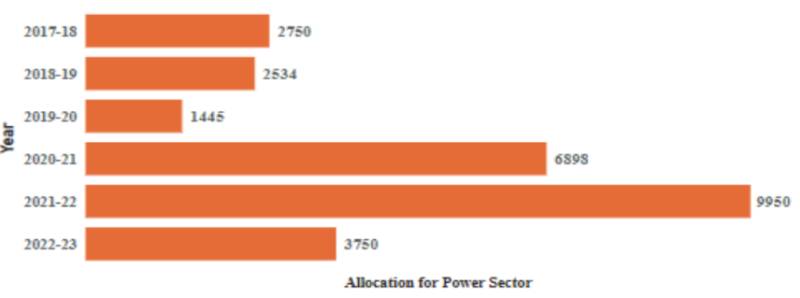Every year tourists go to Gilgit Baltistan and spend their holidays there, but no one discusses or highlights the issues and problems of GB. This region is facing serious socio-economic issues one of them being the state of energy crisis. A few days ago, news of an operation of a patient on a mobile flashlight in Gilgit city was being circulated on social media that showed the state of the energy crisis in GB.
Lack of resources and investment can be a reason for any crisis, but this region has huge potential for the generation of green hydro energy, and millions of rupees are also allocated for various hydro-energy projects in the federal PSDP. The following figure shows the allocation of PKR million for the energy sector of Gilgit Baltistan in the federal PSDP.

Unfortunately, the lack of proper research-based hydro-energy projects has converted whole areas into dark jungles. Every year millions of rupees are allocated for GB’s energy sector in the federal PSDP, but most of them are spent on hydro-energy generation on small-stream without any cost-benefit analysis. During the winter season streams freeze, and the flow of water stops as a result of generation capacity reduce significantly.
During project selection and implementation, the government doesn’t consider the feasibility of projects. The concerned departments consider such places where already energy is generated. In such cases, the number of power stations increases as the annual report of the Planning Commission Gilgit Baltistan mentioned the number of power stations increased to 180 in 2022. However, it badly affected generation capacity since the same water resource is distributed among them.
This region is highly prone to climate change, and environmental assessment becomes necessary before any development project/scheme. Like other development projects, most hydro-power projects are selected without analyzing the environmental assessment.
Since this area is highly prone to climate change and hydro-power projects are constructed in disaster-prone areas then later they produce high maintenance cost. The damage of the Hassanabad (Hunza) hydro-power project is an example that was damaged during the 2022 glacial lake outburst flood.
The Water and Power Department of Gilgit Baltistan (WPD-GB) is responsible for project selection and implementation. During the implementation phase of projects due to lack of technical expertise, there is no mechanism for proper monitoring of projects.
Along with this nepotism and corruption in the Water and Power Department Gilgit Baltistan, the officers also don’t report about the slow pace of projects and use of low-quality inputs. With the help of open bidding system private constructors become responsible bodies for the projects but due to corruption and nepotism, constructors usually use low-quality inputs.
After the completion of projects, the installed capacity of projects began to decline. The use of low-quality inputs also damaged forest and agricultural land because of the large distance between the water reservoir and power station and pipelines are used for water transport. The low-quality pipelines cannot control the pressure of water and soon water linkage became problematic.
Elite capture and mismanagement also intensified the energy crisis in Gilgit Baltistan. In the current scenario duration of load shedding has reached 15-20 hours while bureaucratic and political elites are free from load shedding. The government has allocated them special power connections that provide them power 24/7. Interestingly most of them are also indebted to the Power Department of Gilgit Baltistan due to their non-payment of power bills.
Technical training programs play a vital role in managing resources. They help to improve human skills level and make people familiar with the latest technology. After the recruitment of technical staff, the power department GB doesn’t focus on human capacity development and training programs which leads to the issue of mismanagement in the power sector.
There are numerous ways to deal with GB’s energy crisis. Most of the current hydro-power projects are constructed on different small streams where water flow reduces during winter and cold seasons due to the freezing of water. There are six rivers in GB which are the most suitable places for investment. Public-private partnerships can be a potential tool to unlock the hydro-energy potential of these rivers.
The Dimaer-Basha dam which is under construction has 4500 MW installed capacity of green energy, but the government of Pakistan owns full royalty of this project. As GB is not included in the national power grid of Pakistan, proportional royalty allocation to the government of Pakistan can also reduce the power crisis of this region.
The concept of special power connection should be terminated as soon as possible because they consume more energy units and even don’t pay for the consumption. Along with special connections, power connections of all the government departments that don’t pay their bill should also terminate.



